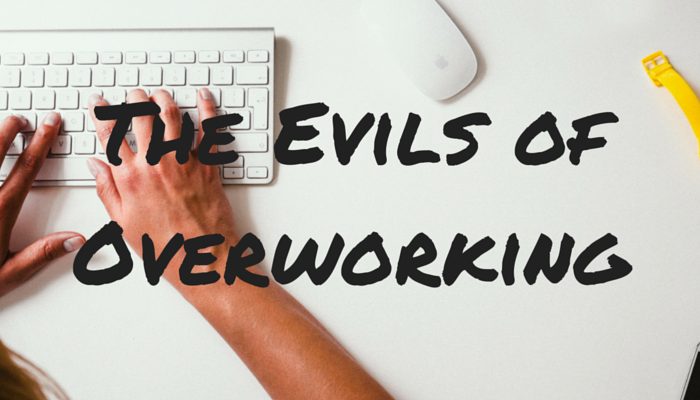The 7 Evils of No Work-Life Balance

“I worked 80 hours last week. I’ve been home only three days this entire month, and I get three hours of sleep a night.” Sound familiar? Hopefully not, but for some it may be their work-life balance reality.
We live in a society where going harder, longer, and faster is rewarded. We’re praised by our superiors when we do. We even award ourselves when we sacrifice to go countless extra miles. We bask in being a multi-tasking, world conquering badass. We are woman, hear us roar!
This is all fine and dandy. We feel empowered and powerful. We’re kicking ass and taking names. But at what expense? At what point are we sacrificing a lot for a little? Where’s that point of diminishing returns? And, more importantly, what’s it costing us?
1. It messes up your sleep
We all know it’s suggested to get eight hours of sleep each night. Raise your hand if you purposefully get those full eight hours. Hmmm… OK. Can’t actually see you, but we bet it isn’t too many.
We sleep less when overworked. Why? Well, because we’re working, or thinking about working, or trying to wind down from working, or squeezing in time with our loved ones between working, or our brains our fried with images of our computer screen and social media feed from working.
Your lack of sleep leads to a sleep debt. Sleep debt is overdrawing from the sleep bank. You, chickie, just got hit with an overdraft charge. The nasty fee: It can have negative effects on your hippocampus, the part of the brain responsible for your learning, memory, and emotions. Folks with depression show a reduction in size of the hippocampus.
Takeaway: Don’t shrink your hippocampus! Just as you would for biceps and quads, make gains for your brain. And, let’s not forget the usual suspects. Long term sleep deprivation raises the risk of obesity, heart disease, diabetes, and stroke.
Before you go bragging that you only need five hours of sleep to function, a sleep study profiled in the Wall Street Journal found that only 1-3% of us are actually “short sleepers.” These people are those lucky few who are always uppity and ambitious day-in and day-out on just mere hours of shut eye. So for the rest of you claiming you only need a few hours of sleep, you’re only propelling yourself into a chronic sleep deprived state.
2. It messes up your good habits
You know, those habits that we practice to prevent obesity, heart disease, diabetes, and stroke. The pie is only so big. There is no baking a bigger pie to fit more time into the day. You only get 24 hours. If working is gluttonously slicing off a bigger piece of that pie, then exercise, meal prep, and socializing is left with the crumbs. (Wait. Are you hungry for pie now, too? Dang it! We need a new metaphor.)
“But wait, I’ll just wake up at 4 a.m. to squeeze in a run.” Really? Did you read the section above? Let’s talk more about this! Brain scans show that when we’re sleepy, we make bad food decisions. But do we really need science to tell us this? Nope. Anything edible within in the vicinity goes into our mouths when we’re exhausted. We don’t feel like cooking. Calories are calories. It’ll burn it off later. No biggie. Until, this becomes the norm. Your new norm is an unhealthy addiction to sugar and fast food. Tootle-loo to the healthy habits and the six pack abs that you’re waking up to mold at 4 a.m.
3. It messes up your heart
Heartbreak. Not like that boy that got away, but in the long-term (or not so long-term if it shortens your life span) kind of way. A heart study published by University College London found that those who worked three or more hours longer than a standard seven-hour work day had a 60% higher risk of heart-related problems than those who did not work overtime.
Why? They proposed a multitude of fascinating possibilities:
- Working overtime is related to Type A personalities. (You know, those people who are naturally aggressive, competitive, time-conscious, and tense.
- Overworking messes with your sleep (as we discussed above).
- High blood pressure can be related to work place stress.
- Working too much leaves less time to squeeze in an appointment with your doc for regular check ups, or when you’re actually ill.
Do yourself a favor. Work to restore your work-life balance and leave the heartbreaking to the boys.
4. It messes up your sobriety
“I need a drink.” How many times have you said this today? Yep, when we’re stressed we turn to booze. Work hard. Play hard. But how hard are we working, before we play too hard? The magic number is 49+ hours per week, according to research conducted by the Finnish Institute of Occupational Health. Those working between 49-54 hours are 13% more likely to engage in risky drinking behavior (Not necessarily the kind where you make really poor (but hilarious) decisions after a few cocktails. That engagement rate is about 100%). This is true regardless of gender, region, or socioeconomic group. Definition of heavy drinking: Ladies, we’re looking at 14 drinks per week and 21 drinks per week for the men.
Alcoholism is bad. It leads to a whole slew of health problems that can escalate quickly and become permanent. It’s ugly. Don’t go there. Enjoy your alcohol, but in moderation. With girlfriends. Preferably in Cabarete by way of a fresh mojito after an exhausting day of adventuring. (Shameless plug.)
5. It messes up your output
More input does not necessarily mean more output. Diminishing returns, folks. The one exception is if you have a critical deadline to meet. You have a goal and the extra hours can be productive. Yet, you probably don’t have pressing projects weekly.
This time crunch is only beneficial briefly. Instead, your extra hours—let’s say 50% more hours—only generates 25-30% more production. Is it worth it? Refer to all of the above! In an article on Salon.com, author Sara Robbins explains that our most productive hours are between hours 2-6 of working. It’s all downhill from there, culminating in full exhaustion between hours 10-12. Plan accordingly before your work-life balance gets really out of whack.
6. It messes up your quality of work
Mistakes! Have you ever reread an email or text and thought WTH is a “cobtact” or some other nonsensical gibberish? Depending on your workplace, mistakes can be deadly both for you and your career.
7. It messes up the bigger picture
Can you see the forest through the trees? Not if you’re overworked. Nope. You’re just seeing a bunch of moss and sticks while getting pooped on by the birds nesting in the canopy above. You lose focus! We need little breaks to recharge, replenish, and refuel. The time away from our projects lets our minds wander, the ideas flow, and projects just marinade in juicy goodness.
There you have it. Should you march into your boss’s office right now and throw this blog down onto her desk? Maybe not. Should you share it with all of your female co-workers and friends? Yes, please!
Ways to Correct Your Work-Life Balance
Take an inventory of how much you are working and how it has affected you mentally and physically. Then start making small changes such as:
- Setting a routine for sleep and exercise.
- Keeping your smart phone in a different room for a few hours to completely disconnect. (Your phone won’t be lonely or get its feelings hurt. It deserves a break, too!)
- Spending time on the weekends or your time off away from technology.
The last one is the most difficult. It’s so easy to check email and social media on-the-go with our phones, but what are you really achieving? Have the discipline to completely avoid it so you can return to your work bright-eyed and bushy-tailed. Don’t feel guilty leaving it behind. We integrate rest days in our fitness routines. What happens during rest days? Our muscles rebuild and we become stronger. Same philosophy, but for our powerhouse brains. Don’t neglect rest day.
How do you find balance? What are your hacks to keeping your work under control? Did we miss an evil of overworking? Let us know over at the We Are Explorer Chick Facebook page or on Twitter!
Overworked and can’t find the time to plan your trip?
Join Explorer Chick on one of our upcoming adventures! We do all of the planning and research, and then guide you throughout your trip. Do your work-life balance sheet a favor: just book and show up—we’ll take care of the rest!







